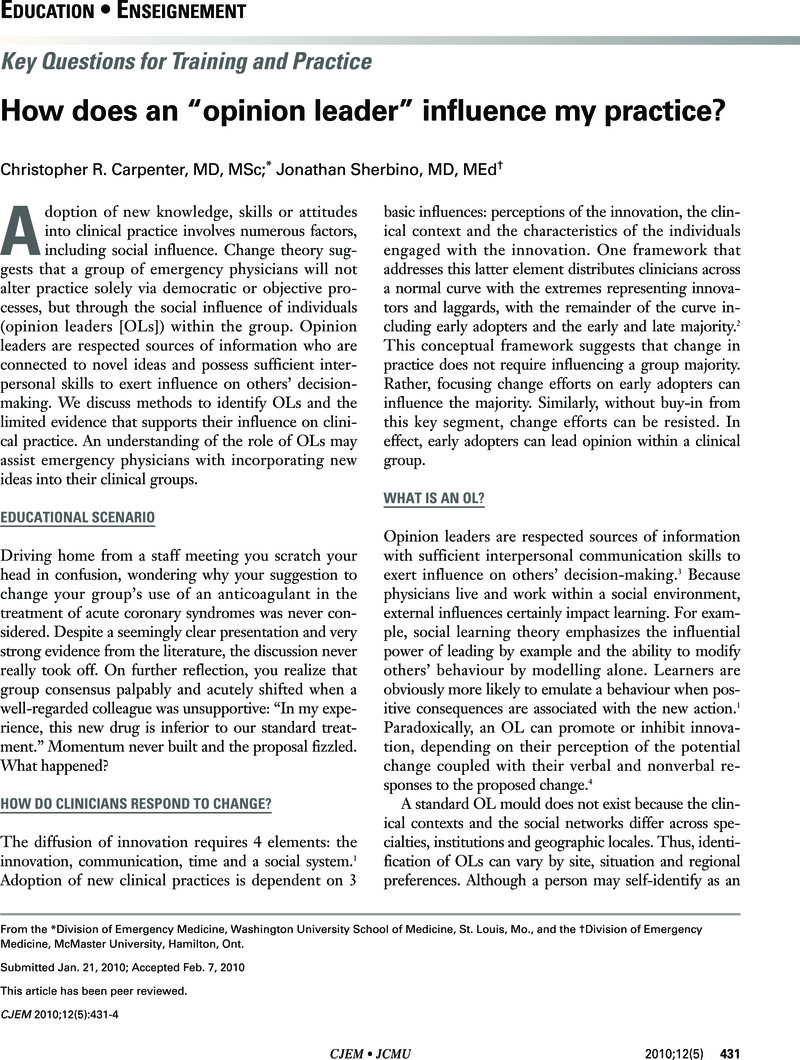Crossref Citations
This article has been cited by the following publications. This list is generated based on data provided by Crossref.
Carpenter, Christopher R.
Kane, Bryan G.
Carter, Merle
Lucas, Raymond
Wilbur, Lee G.
and
Graffeo, Charles S.
2010.
Incorporating Evidence‐based Medicine into Resident Education: A CORD Survey of Faculty and Resident Expectations.
Academic Emergency Medicine,
Vol. 17,
Issue. s2,
Carpenter, Christopher R.
2012.
Practical Teaching in Emergency Medicine.
p.
151.
Lefebvre, Cedric W.
Hiestand, Brian
Bond, Michael C.
Fox, Sean M.
Char, Doug
Weber, Drew S.
Glenn, David
Patterson, Leigh A.
and
Manthey, David E.
2013.
Increasing Faculty Attendance at Emergency Medicine Resident Conferences: Does CME Credit Make a Difference?.
Journal of Graduate Medical Education,
Vol. 5,
Issue. 1,
p.
41.
Andrews, Verity
Tonkin, Emma
Lancastle, Deborah
and
Kirk, Maggie
2014.
Identifying the characteristics of nurse opinion leaders to aid the integration of genetics in nursing practice.
Journal of Advanced Nursing,
Vol. 70,
Issue. 11,
p.
2598.
Boggi, Ugo
Caniglia, Fabio
and
Amorese, Gabriella
2014.
Laparoscopic robot‐assisted major hepatectomy.
Journal of Hepato-Biliary-Pancreatic Sciences,
Vol. 21,
Issue. 1,
p.
3.
Reach, Gérard
2015.
Clinical Inertia.
p.
97.
Feldman, Kira
Berall, Anna
Karuza, Jurgis
Senderovich, Helen
Perri, Giulia-Anna
and
Grossman, Daphna
2016.
Knowledge translation: An interprofessional approach to integrating a pain consult team within an acute care unit.
Journal of Interprofessional Care,
Vol. 30,
Issue. 6,
p.
816.
Akenroye, Ayobami T
and
Stack, Anne M
2016.
The development and evaluation of an evidence-based guideline programme to improve care in a paediatric emergency department.
Emergency Medicine Journal,
Vol. 33,
Issue. 2,
p.
109.
Rosenberg, Stephen A.
Baschnagel, Andrew M.
Bagley, Stephen J.
and
Housri, Nadine
2017.
Strategies for Translating Evidence-Based Medicine in Lung Cancer into Community Practice.
Current Oncology Reports,
Vol. 19,
Issue. 1,
Steinhart, Brian D.
Levy, Phillip
Vandenberghe, Hilde
Moe, Gordon
Yan, Andrew T.
Cohen, Ashley
Thorpe, Kevin E.
McGowan, Melissa
and
Mazer, C. David
2017.
A Randomized Control Trial Using a Validated Prediction Model for Diagnosing Acute Heart Failure in Undifferentiated Dyspneic Emergency Department Patients—Results of the GASP4Ar Study.
Journal of Cardiac Failure,
Vol. 23,
Issue. 2,
p.
145.
Carpenter, Christopher R.
Pinnock, Hilary
and
Burton, John H.
2017.
Starry Aims to Overcome Knowledge Translation Inertia: The Standards for Reporting Implementation Studies (StaRI) Guidelines.
Academic Emergency Medicine,
Vol. 24,
Issue. 8,
p.
1027.
Vachon, Brigitte
Foucault, Marie-Lyse
Giguère, Charles-Édouard
Rochette, Annie
Thomas, Aliki
and
Morel, Martine
2018.
Factors Influencing Acceptability and Perceived Impacts of a Mandatory ePortfolio Implemented by an Occupational Therapy Regulatory Organization.
Journal of Continuing Education in the Health Professions,
Vol. 38,
Issue. 1,
p.
25.
Chan, Teresa
Trueger, N. Seth
Roland, Damian
and
Thoma, Brent
2018.
Evidence-based medicine in the era of social media: Scholarly engagement through participation and online interaction.
CJEM,
Vol. 20,
Issue. 1,
p.
3.
Atzema, Clare L.
2018.
Stroke Prevention for High-Risk Atrial Fibrillation in the Emergency Setting: The Emergency Physician Perspective.
Canadian Journal of Cardiology,
Vol. 34,
Issue. 2,
p.
125.
Thoma, Brent
Murray, Heather
Huang, Simon York Ming
Milne, William Ken
Martin, Lynsey J.
Bond, Christopher M.
Mohindra, Rohit
Chin, Alvin
Yeh, Calvin H.
Sanderson, William B.
and
Chan, Teresa M.
2018.
The impact of social media promotion with infographics and podcasts on research dissemination and readership.
CJEM,
Vol. 20,
Issue. 2,
p.
300.
Hao, Haijing
and
Padman, Rema
2018.
An empirical study of opinion leader effects on mobile technology implementation by physicians in an American community health system.
Health Informatics Journal,
Vol. 24,
Issue. 3,
p.
323.
Bamakan, Seyed Mojtaba Hosseini
Nurgaliev, Ildar
and
Qu, Qiang
2019.
Opinion leader detection: A methodological review.
Expert Systems with Applications,
Vol. 115,
Issue. ,
p.
200.
Zou, Yushan
and
Peng, Fanke
2019.
Fashion Communication in the Digital Age.
p.
118.
Chan, Teresa M.
Stehman, Christine
Gottlieb, Michael
and
Thoma, Brent
2020.
A Short History of Free Open Access Medical Education. The Past, Present, and Future.
ATS Scholar,
Vol. 1,
Issue. 2,
p.
87.
Bejjani, Anthony
Burt, Lindsay
Washington, Christina
Terao, Michael
Housri, Samir
and
Housri, Nadine
2020.
Using a Collaborative, Virtual Discussion Platform to Mobilize Oncologic Expertise for the COVID-19 Pandemic.
JCO Clinical Cancer Informatics,
p.
794.



